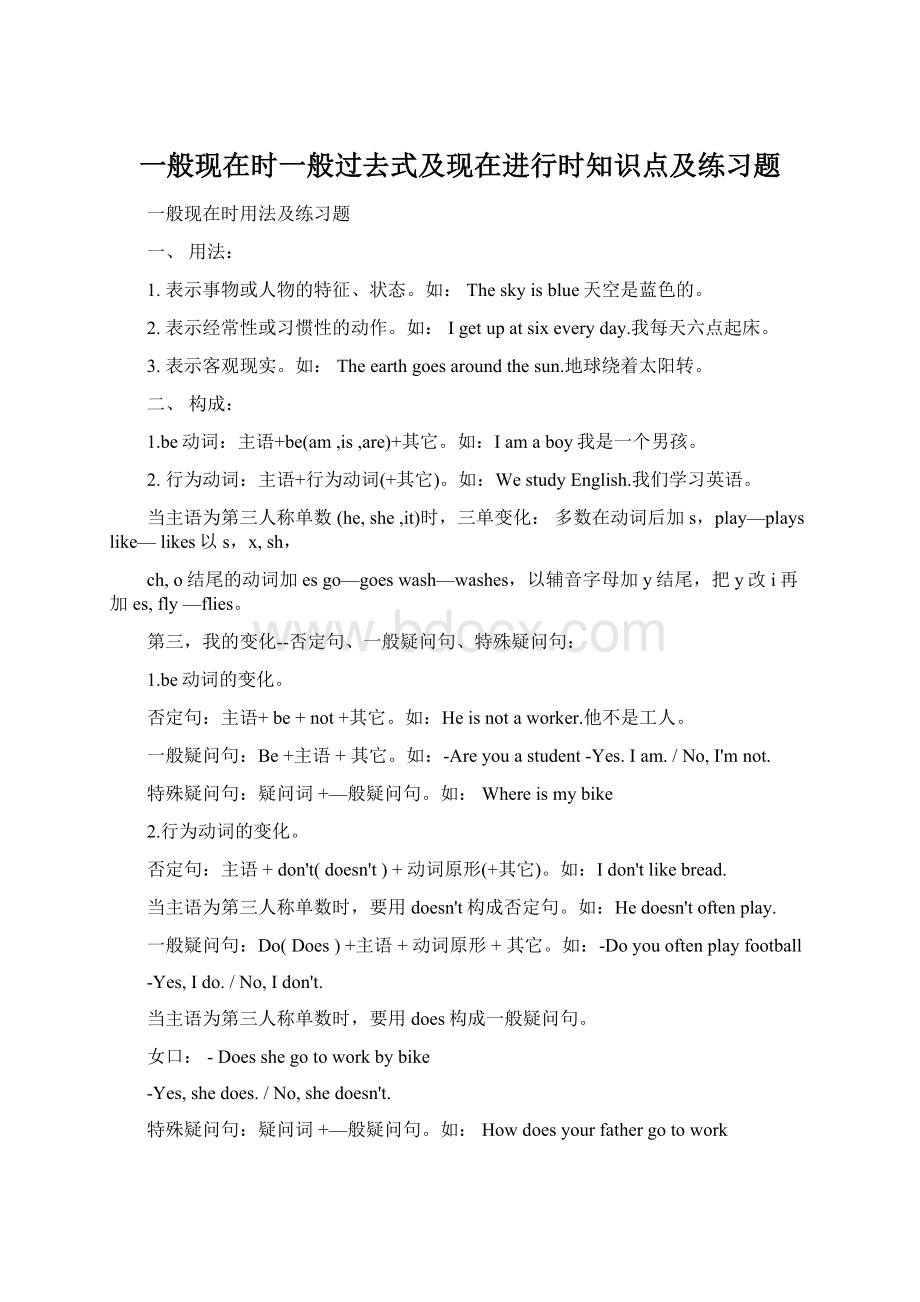一般现在时一般过去式及现在进行时知识点及练习题.docx
《一般现在时一般过去式及现在进行时知识点及练习题.docx》由会员分享,可在线阅读,更多相关《一般现在时一般过去式及现在进行时知识点及练习题.docx(13页珍藏版)》请在冰豆网上搜索。

一般现在时一般过去式及现在进行时知识点及练习题
一般现在时用法及练习题
一、用法:
1.表示事物或人物的特征、状态。
如:
Theskyisblue天空是蓝色的。
2.表示经常性或习惯性的动作。
如:
Igetupatsixeveryday.我每天六点起床。
3.表示客观现实。
如:
Theearthgoesaroundthesun.地球绕着太阳转。
二、构成:
1.be动词:
主语+be(am,is,are)+其它。
如:
Iamaboy我是一个男孩。
2.行为动词:
主语+行为动词(+其它)。
如:
WestudyEnglish.我们学习英语。
当主语为第三人称单数(he,she,it)时,三单变化:
多数在动词后加s,play—playslike—likes以s,x,sh,
ch,o结尾的动词加esgo—goeswash—washes,以辅音字母加y结尾,把y改i再加es,fly—flies。
第三,我的变化--否定句、一般疑问句、特殊疑问句:
1.be动词的变化。
否定句:
主语+be+not+其它。
如:
Heisnotaworker.他不是工人。
一般疑问句:
Be+主语+其它。
如:
-Areyouastudent-Yes.Iam./No,I'mnot.
特殊疑问句:
疑问词+—般疑问句。
如:
Whereismybike
2.行为动词的变化。
否定句:
主语+don't(doesn't)+动词原形(+其它)。
如:
Idon'tlikebread.
当主语为第三人称单数时,要用doesn't构成否定句。
如:
Hedoesn'toftenplay.
一般疑问句:
Do(Does)+主语+动词原形+其它。
如:
-Doyouoftenplayfootball
-Yes,Ido./No,Idon't.
当主语为第三人称单数时,要用does构成一般疑问句。
女口:
-Doesshegotoworkbybike
-Yes,shedoes./No,shedoesn't.
特殊疑问句:
疑问词+—般疑问句。
如:
Howdoesyourfathergotowork
同学们需要掌握的一般现在时第三人称单数形式:
Lives,teaches,goes,watches,reads,does,works,does,
doesn'
一般过去式及练习
一、基本概念
一般过去时(simplepasttense)表示过去某个时间里发生的动作或状态;过去习惯性、经常性的动作、行为;
过去主语所具备的能力和性格。
二、基本结构
主语+动词过去式+其他否定形式①was/were+not;②在行为动词前加didn't,同时还原行为动词
一般疑问句Did+主语+do+其他例句Sheoftencametohelpusinthosedays.Ididn'tknowyouweresobusy.
一般过去式的构成形式
肯定式
疑问式
否定式
疑问否定式
Iworked
DidIwork
Ididnotwork
DidInotwork
He(she,it)didnot
He(she,it)worked
Didhe(she,it)work
work
Didhe(she,it)notwork
Weworked
Didwework
Wedidnotwork
Didwenotwork
Youworked
Didyouwork
Youdidnotwork
Didyounotwork
Theyworked
Didtheywork
Theydidnotwork
Didtheynotwork
三、一般过去时的用法
(1)一般过去时表示在过去某个特定时间发生,也可以表示过去习惯性、经常性的动作。
一般过去时不强调动作对现在的影响,只说明过去的事情。
句式:
主语+过去动词+宾语+其他女口:
IhadawordwithJuliathismorning.今天早晨,我跟朱丽亚说了几句话。
Hesmokedmanycigarettesadayuntilhegaveup.他没有戒烟的那阵子,抽烟抽得可凶了。
(2)—般过去时常与表示过去的时间状语或从句连用,女口:
yesterday,lastweek,in1993,atthattime,once,
duringthewar,before,afewdaysago,when等等。
补充内容:
(句子中谓语动词是用一般过去时还是用现在完成时,取决于动作是否对现在有影响。
Haveyouhadyourlunch你吃过午饭了吗(你现在不饿吗)Yes,Ihave.是的,我已经吃过了。
(已经吃
饱了,不想再吃了。
)Whendidyouhaveit你是什么时候吃的(关心的是吃的动作发生在何时。
)Ihaditabouttenminutesago.我大约是十分钟以前吃的。
)
Usedtodosomething表示过去常做而现在已经停止了的习惯动作。
Iusedtoworkfourteenhoursaday.
我过去常常一天干十四个小时。
Iateitat6:
45。
我在六点四十五分吃了。
注意:
1、带有确定的过去时间状语时,要用过去时如如:
yesterday(昨天)、wodaysago--(两天前)、
lastyea「-(去年…)、theotherday(前几天)、onceuponatime(很久以前)、justnow(刚才)、intheolddays(过去的日子里)、beforeliberation(解放前…)、WhenIwas8yearsold(当我八岁时…)、at+一个时间点Didyouhaveapartytheotherday前几天,你们开了晚会了吗LeiFengwasagoodsoldier.
雷锋是个好战士。
另外,在谈到已死去的人的情况时,多用过去时。
2、表示过去连续发生的动作时,要用过去时这种情况下,往往没有表示过去的时间状语,而
通过上下文来表示。
Theboyopenedhiseyesforamoment,lookedatthecaptain,andthendied.那
男孩把眼睛张开了一会儿,看看船长,然后就去世了。
3、表示过去一段时间内经常或反复的动作,常与always,never等连用。
Mrs.Peteralwayscarried
anumbrella.彼得太太过去老是带着一把伞。
(只是说明她过去的动作,不表明她现在是否常带
着伞。
)比较Mrs.Peteralwayscarriesanumbrella.彼得太太老是带着伞。
(说明这是
她的习惯,表明她现在仍然还习惯总带着一把伞)Mrs.Peterisalwayscarryinganumbrella.彼得
太太总是带着一把伞。
(表示说话者对这一动作或行为厌烦)Ineverdrankwine.我以前从不喝酒。
(不涉及到现在,不说明现在是否喝酒)
4、如果强调已经终止的习惯时要用usedtodo(过去常常做,而现在不那样做了)Heusedtodrink.他过去喝酒。
(意味着他现在不喝酒了。
喝酒这个动作终止了)Iusedtotakeawalkinthemorning.
我过去是在早晨散步。
(意味着现在不在早晨散步了)比较:
Itookawalkinthemorning.
我曾经在早晨散过步。
(只是说明过去这一动作)
5、有些句子,虽然没有表示过去确定时间的状语,但实际上是指过去发生的动作或存在的状态的话,
也要用过去时,这一点,我们中国学生往往出错,要特别注意!
Idon'tknowyouwereinParis.我
不知道你在巴黎。
(因为在说话时,我已经知道你在巴黎了。
这句话指的是说话之前,所以只能用过
去时表示。
实际上,这句话暗指:
ButnowIknowyouarehere.)Ithinkyouwereill.我以为你病
了呢。
(这句话应是在说话之前,我以为你病了。
但是现在我知道你没病)
四、一般过去时谓语部分的构成
1.Be动词的一般过去时态.
在没有实义动词的句子中使用be动词,amis的过去式为was;are的过去式为were.构成:
肯定句:
主语+was(were)+表语如口:
Iwaslateyesterday.(昨天我迟至U了。
)否定句:
主语+was(were)
+not+表语如口:
Weweren'tlateyesterday.(我们昨天没迟到)疑问句:
Was(Were)+主语+表语
如:
Wereyouillyesterday(你昨天病了吗)肯定回答:
Yes,Iwas.是的,我病了。
)否定句:
No,Iwasn't.(不,我没病。
)特殊疑问句:
特殊疑问词+was(were)+主语+表语如口:
Whenwereyou
born你是什么时候出生的
2.实义动词的一般过去时态
肯定句要使用动词的过去式,否定句和疑问句要使用助动词do和does的过去式did.肯定句为:
主语+动词过去式+宾语如:
Iwenthomeatnineo'clockyesterday.(我昨天九点钟回的家。
)否定
句:
主语+didn't+动词原形+宾语如:
Ididn'tgohomeyesterday.(我昨天没回家。
)疑问句:
Did+
主语+动词原形+宾语如:
Didyougohomeyesterday(你昨天回家了吗)肯定回答:
Yes,Idid.(是
的,我回了。
)否定回答:
No,Ididn't.(不,我没回家。
)
3.助动词和情态动词过去式如下:
shall—should(将要)用于第一人称单数will—would(将要)用于所有人称can—could(能,
会)may—might(可以)must—must(必须)haveto—hadto(不得不)助动词和情态动词
的过去时态要使用他们的过去式,后面的动词还使用原形。
如:
Ihadtodomyhomeworkyesterday.(昨天我不得不做作业。
)一般过去时讲解一般过去时也叫单纯过去时。
例A:
Heworkedvery
hardlastyear.(去年他很用功。
)例B:
Mr.Smithboughtanewcaryesterday.(史密斯先生
昨天买了一辆新车。
)例C:
Theywerehereonlyafewminutesago.(几分钟前他们还在这里。
)
一般过去时的用法如下:
一般过去时最明显的现象就是常由表达过去之时间的副词或副词短语来修饰
它(如各例句的斜体字部分)。
这些常用于修饰一般过去时的副词有:
yesterday,yesterdaymorning(afternoon,evening),justnow(刚才),before(以前),then(atthattime)(当时),last+时间(如lastweek,month,year,Monday,…January,…spring,…,etc.),that+时间(女口thatday,afternoon,summer,…,etc.),时间+ago(女口afewminutesago,twoweeksago,yearsago,…etc.)“过去”的概念并不
是只指如“yesterday,lastweek,…”等,实际上“与现在对立的过去”,亦即“非现在的以前”,哪怕是
“过了说话时间的几分钟之前”,只要所要表达的时间与说话时的“现在”形成对立,就必须使用一般过去时来表达。
例如:
Hewashereonlyafewminutesago.(仅仅几分钟前他还在这里。
)Icame
homejustnow.(我刚回到家。
)
五、特殊疑问句:
⑴疑问词+did+主语+动词原形如:
WhatdidJimdoyesterday
⑵疑问词当主语时:
疑问词+动词过去式如:
Whowenttohomeyesterday
六、动词过去式变化规则:
1.一般在动词末尾加-ed,如:
pull-pulled,cook-cooked
2.结尾是e加d,如:
taste-tasted
3.末尾只有一个元音字母和一个辅音字母的重读闭音节,应双写末尾的辅音字母,再加-ed,如:
stop-stopped
4.以"辅音字母+y”结尾的,变y为i,再加-ed,如:
study-studied
5.不规则动词过去式(详见书本)
三、现在进行时
1、现在进行时:
现在进行时表示正在发生或进行的动作。
常与now,atthemoment等时间状语连用。
其基本结构:
be(is/am/are)+v-ing。
例:
Heissleepingatthemoment.
2、表示当前一段时间内的活动或现阶段正在进行的动作。
例:
IamstudyinginDatunHighSchool.
Theyareworkinginafactorythesedays.
3、某些动词的现在进行时可表将来。
例:
WearegoingtoBeijingthisafternoon.
Thebusiscoming.
4、表示经常、反复发生的动作,常与always,continually,constantly,forever等连用,常表示厌烦、不满和赞扬等情感。
例:
Heisalwaysworkinguntilmidnight.(赞扬)
Theyareforeverquarrellingaboutsomething.(不满)
动词v-ing的构成形式:
规则
原形
-ing形式
一般在动词原形末尾加-ing
washcatchstay
washingcatchingstaying
以不发音的字母e结尾的动词。
先去掉e,再加-ing
maketakegive
makingtakinggiving
以重读闭音节结尾的动词,如果末尾只有一个辅音字母,应双写这个
字母,再加-ing
sitgetbegin
sittinggettingbeginning
以ie结尾的单词,改ie为y,再加-ing
liedietie
lyingdyingtying
一般现在时练习
1.Choosetherightanswerstocloze.用括号内适当的形式填空。
often(play)intheplayground.
2.He(get)upatsixolock.'c
3.you(brush)yourteetheverymorning.
4.What(do)heusually(do)afterschool
5.they(like)theWorldCup
6.Mikesometimes(go)totheparkwithhissister.
7.Ateightatnight,she(watch)TVwithhisparents.
8.Mike(read)Englisheveryday
9.Howmanylessonsyourclassmate(have)onMonday
10.Whattimehismother(do)thehousework
usually(get)upatsixinthemorning.
(have)blueseyes.
(go)toschooleveryday
boy(like)playingfootball.
(have)noclassesonSundays.
(write)tohermotheronceaweek.
(rain)quiteoftenduringthemonthofJulyeveryyear.
often(watch)TVonSaturdays.
usually(ride)abikewithhisfriendsinthepark.
20PeterandMaryoften(play)badmintontogether.
mother(have)alotofcousins.
peopleoften(listen)totheradiointhemoring.
(do)she(like)playingtheviolinYes,she(do).
(have)fourbrothers.She(like)themverymuch.
24.Heoften(have)dinnerathome.
25.We(notwatch)TVonMonday.
usually(play)thepianoonSundays.
cat(like)eatingfisheverymuch.
28.SuHaiandSuYang(have)eightlessonsthisterm.
29.SheandI(take)awalktogethereveryevening.
II.Readandfillintheblanks.(选词填空)
Watchesreadgoesgetseatslivesworks
Myauntisanurse.Shelikesmusicverymuch.Sheinabighospital.Everydayshe
upat6:
30.Shebreakfastat7:
00.Afterbreakfastshetoworkbybus.Sheusuallygoeshomeat5:
30.Afterdinner,sheoftenTVandbooks.At10:
30,
shegoestobed.
III.Readthequestionsandcircletherightanswers.(读问题,圈出正确的答案)
doesyourpenpallive
A.No,sheliveinthecountry.B.Sheliveinthecity.C.Shelivesinthecity.
doesshegotowork
A.Shegotoworkat7.B.Shegoestoworkat7.C.Yes,shedoes.
3.DoesPetergotoschoolbysubway
A.No,hedoes.B.No,hedoesn't.C.Yes,onfoot.
4.WhatdoesMissGreendo
A.SheteachesEnglish.B.Yes,she'sateacher.C.Atschool.
shereadnewspapersatnight
A.Yes,shedo.B.Yes,shedoes.C.No,shedoes.'syourpenpal'shobby
A.Shelikereading.B.Shelikeread.C.Shelikesreading.
练习:
1.-Whataboutthepenyouboughtyesterday-Itwell.Ilikeitverymuch.
A.waswrittenB.iswrittenC.wroteD.writes
2.Thereisgoingtoasportsmeetingnextweek.Ifit,we'llhavetocancelit.
A.be;willrainB.have;willrainC.be;rains
3.Tomisstrongandhetoschooleveryday.
A.walkedB.walksC.willwalkD.haswalked
4.-Whatwillyoudoifittomorrow-I'llstayathomeandwatchthematchonTV.
A.rainB.rainsC.willrainD.israining
5.EveryyearmanyforeignerstoChinatolearnChinese.
A.havecomeB.comesC.cameD.come
6.-Iwon'tgotobeduntiltheTVplayover.-You'dbetternotdothat.
A.isB.wasC.willD.willbe
7.Alargenumberofstudentsinthisschoolfromthecountry.Theyworkveryhard.
A.comeB.comesC.came
8.-IwonderifItomorrow.
A.rains,rainsB.willrain,rains
D.coming
-Don'tworry.Ifit,we'llstayathome
C.rains,willrain
9.-Whenwillyoucometoseeme,Dad-Iwillgotoseeyouwhenyouthentraining
course.
A.finished
10.-Whatd